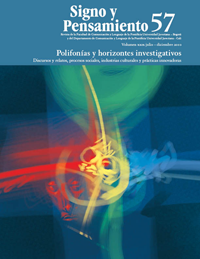Abstract
This paper examines the development of information technologies in Venezuela and how the discursive element legitimizes its own use; to do so, three types of discourse are identified (technological determinism, technological democracy, and technological nationalism.) Based on the fundamental assumption that hegemony is an ideological process in a permanent quest for power, it uses discourse to legitimize itself. We examine how, in Venezuela, concurrently with other state policies that attempt the construction of a communication model based on information technologies, the technical discourse “pervades” environments where the ict’s can legitimize their existence in order to establish an ideological hegemony in society.
Andrade Castro, J.A. et. al. (2005, enero-junio), “Discurso y uso de tecnologías de información: herramientas para la hegemonía del poder”, Revista de Ciencias Sociales, vol. xi, núm. 1, pp. 89-104.
García García, A. J. (2003), Recurso de amparo constitucional de pdvsa contra intesa, Tribunal Supremo de Justicia, disponible en http:// www.tsj.gov.ve/decisiones/scon/junio/1506- 050603-03-1295.htm, recuperado: 18 de febrero de 2010.
Maldonado Fermín, A. (2005), “Instituciones clave en la producción y circulación de ideas (neo) liberales en Venezuela”, en Mato, D. (coord.), Políticas de economía, ambiente y sociedad en tiempos de globalización, Caracas, Universidad Central de Venezuela.
Navarro, H. (2010), “Guerrilla comunicacional garantiza derecho a la participación de todos los venezolanos”, Agencia Bolivariana de Noticias, disponible en http://www.abn. info.ve/noticia.php?articulo=229788&lee=2, recuperado: 26 de abril de 2010.
The Department of Commerce (2003), Venezuela Industry: Information y Communication Sector: Telecommunications Services, disponible en http://strategis.gc.ca/epic/internet/inimr-ri. nsf/en/gr113580e.html, recuperado: 5 de septiembre de 2009.
Vizer, E. A. (2009, julio-diciembre), “Dimensiones de la comunicación y la información: la doble faz de la realidad social”, Signo y Pensamiento, vol. xxviii, núm. 55, pp. 234-246.
Young, D. (2003), “Discourses on Communication Technologies in Canadian and European Broadcasting Policy Debates”; European Journal of Communication, vol. 2, núm. 18, pp. 209-240.
This journal is registered under a Creative Commons Attribution 4.0 International Public License. Thus, this work may be reproduced, distributed, and publicly shared in digital format, as long as the names of the authors and Pontificia Universidad Javeriana are acknowledged. Others are allowed to quote, adapt, transform, auto-archive, republish, and create based on this material, for any purpose (even commercial ones), provided the authorship is duly acknowledged, a link to the original work is provided, and it is specified if changes have been made. Pontificia Universidad Javeriana does not hold the rights of published works and the authors are solely responsible for the contents of their works; they keep the moral, intellectual, privacy, and publicity rights.
Approving the intervention of the work (review, copy-editing, translation, layout) and the following outreach, are granted through an use license and not through an assignment of rights. This means the journal and Pontificia Universidad Javeriana cannot be held responsible for any ethical malpractice by the authors. As a consequence of the protection granted by the use license, the journal is not required to publish recantations or modify information already published, unless the errata stems from the editorial management process. Publishing contents in this journal does not generate royalties for contributors.


